(To listen to Trace discuss all this on the latest episode of the podcast, click here.)
I have a confession.
Those of you who pay altogether too much attention to the ins and outs of online drama may have seen a curious tweet from the account Libs of TikTok the other day:
Astute observers noticed something was wrong from the get-go. What sort of school would spend time on furries? Would a teacher, even one irresponsible enough to give an assignment like that to second graders, really include the words “musky” and “maws” in a word search? Where was the Facebook group, “Moms of Austin,” that the post was supposedly found within?
Mind, that didn’t stop some eager watchers from taking it seriously. Conservative commentator Matt Walsh referenced it in a video to demonstrate how schools are promoting “bestiality culture.” James Lindsay, who rose to fame by writing hoax papers, jumped on it as an example of how the Woke are ruining the furry fandom. A Daily Caller writer spun a whole article out of it, then—bafflingly—doubled down after the hoax was revealed.
More would have hopped on the bandwagon, perhaps, but Mashable’s Matt Binder put in the legwork, sniffed around, and found that the whole thing was made up out of whole cloth.
Credit to him for good reporting. Can’t say I’m not a bit disappointed, though.
After all, who doesn’t long for the chance to debunk their own hoax?
So—what does it take to persuade Libs of TikTok to tilt at windmills, to spread a moral panic over a falsehood? How can hoaxers break past her fact-checking, with nary a red flag to be seen?
A nonexistent man passed on a false tip on the basis of paper-thin evidence, then squirmed away at any attempts to nail down the concrete before finishing things off with a broken link to a Facebook group that did not exist.
We’ll get there. I’d like to provide as full a picture as possible of the process—to fill in the gaps that third-hand reporting cannot, and to outline how this sort of thing happens so it can be prevented. Frankly, it’s also a fun story that we worked hard on.
In this, I aim to balance the dual roles of prankster and commentator, providing a lighthearted account of the prank itself alongside a more serious examination of the more universal dynamics around it all. If you walk away laughing only at how foolish your enemies are, or furious only at how your enemies set you up, I will take it as a point of failure on my part.
The hoax started as a throwaway joke in—and yes, I do have the decency to be a mite embarrassed as I say this—an obscure Discord server I run called “Dramafurs.”
Look, we all have our hobbies. One of mine just so happens to be cultivating a furry infestation on an obscure trolling forum, then wreaking merry havoc alongside them. What can I say? Furries are overwhelmingly leftist; online trolls these days overwhelmingly mock leftists. Furries are often altogether too self-serious about what is on its face an absurd and amusing hobby; there are few targets online trolls find easier to mock than furries. I wanted to find out just who would occupy the peculiar intersection of those two spheres, so incompatible on their face.
And having done that, well, how could I resist the vision painted by, ahem, “Some Gay Furry,” of creating worksheets, ostensibly for elementary school kids, with subtly inappropriate content slipped in?
It felt, as I said, too memetically powerful—the sort of story culture warriors couldn’t help but jump on. It’s not the sort of thing I’d pursue normally. Trolling has never really been my style. I write to make sense of the world for myself, and I aspire to directness and honesty. Creating fake accounts, spreading rumors, wreaking merry havoc—as much of a guilty pleasure as it is for me to watch people do that, I much prefer to be the one who pulls back the curtain on that sort of chaos. And, indeed, this would likely have fizzled as one of many throwaway jokes had we not involved one Corvus Calvaria.
Corvus is an odd fellow who certainly deserves more of an introduction than this article can give. He’s developed a certain notoriety around reddit: a power moderator who helps with dozens of subreddits and, every now and again, throws wrenches into them to see how people will react. If anyone could make a hoax like this convincing, I figured, it would be him.
Within a few hours, he had whipped up a couple of convincing worksheets for us:
The worksheets were meticulously laid out: mostly innocent on the surface with hints of something people would find sinister: “musky” and “husky” planted next to each other in the word search, a “non-binary” check box next to “male” and “female” on the fursona design worksheet, games every child plays next to memes only people far too familiar with the furry fandom would pick up on. That taken care of, we seeded the word search with a few references to rdrama, the trolling forum I had gathered the participants from.
With Corvus having done the heavy lifting of actually creating something tangible, I felt like I ought to pitch in a bit more, so I dug up a “Culture Day” worksheet from a teacher resource website and added my own spin on it:
From there, things flowed naturally, one into another. Another friend printed them out, weathered them, and provided a nice-looking homework folder:
We had some fun picking a location: just the right amount of reputation for “lib insanity,” with just enough people around who would care about that. It was between Austin and Georgia; ultimately, Austin felt right. Naming a specific school was never on the table. Our goal was to keep it in “funny prank” territory, providing a vague image of a boogeyman with nothing solid to latch onto, a rumor with no substance beneath. But we did want a city.
Finally, we needed to present it in a way that would be plausible on the surface, but unverifiable and a bit suspicious to anyone doing due diligence. We settled on a story: we would become Charles Sisk, an upstanding Texas citizen whose wife had shown him an alarming post from “Moms of Austin,” a private Facebook group she was in. The Facebook post itself went through a few iterations. How many reactions would it have? How many shares? Which parts should we draw attention to? After a few iterations, we landed on the final image, then touched it up with the obligatory censor bars.
Image and Facebook post in hand, we were ready to shop for customers. Who would have the right combination of prominence, eagerness to farm outrage, and carelessness to wilfully publicize a prank? One Twitter account in particular stood out among the rest: Libs of TikTok, who came most clearly onto my own radar when one of my bosses drew attention to an odd video she posted, ostensibly hinting at furries in schools.
We hardly dared to hope that Libs of TikTok would humor us, but after some consultation and group editing, we shot her an exploratory email.
In all honesty, with the replies we were getting, we thought the game was up pretty quickly. She replied quickly wanting, oddly enough, more details than the vague stew we provided. So we got to inventing. Charles, we decided, desperately wanted the world to know, but his wife’s friend insisted that specifics be kept out of it. We could give the school district, but nothing more.
With the next reply, apparent disaster struck, as Libs of TikTok elected to do the one thing that could foil our scheme: look for actual evidence that any of this had ever happened.
After a bit of thought, we settled on a flimsy-feeling cover story. Hidden Facebook groups don’t show up in search, so we decided to go all-in on a last-ditch bit of social engineering to get around the inconvenient fact that the group did not, in fact, exist. We couldn’t provide proof, but could we provide the lingering temptation to post it, proof or no? We set about drafting a new message.
As we were about to send, she provided us a bit of reassurance by bragging about her “line of communication with Ken Paxton” that “got them to take action against AustinISD pride week.” The break from apparent suspicion was a welcome opening, setting aside the appropriateness of an outrage-bait Twitter account coordinating that closely with state officials.
We leaned into the redirection with the next message, weaving our story about Charles’s wife and her friend while painting Charles himself as a good-natured but mildly tech-uncomfortable fellow.
The whole time, we felt, we were riding the knife’s edge of believability. Of course we couldn’t provide any actual evidence of what was in reality a complete fabrication. With every response, we assumed there was less and less of a chance of success. When she asked for a link to the Facebook group to verify… well, how do you salvage that?
We settled for what felt like the most graceful retreat we could manage. Sorry to waste your time, who else might be able to help us spread the word on this, so forth. After all, the only “verification” we could provide was a broken link to a nonexistent Facebook group. You can try it for yourself here. Charles was polite and complimentary, but we’d more or less given up at this point.
That’s when Libs of TikTok replied to let us know that she’d be posting it.
That was two weeks ago. We celebrated, of course, and then waited eagerly to see the post go up. A few hours, a day, another day—nothing. No reply from her, no post, just radio silence. Disappointing, of course, but, well, it had always been a long shot. As a dejected sort of plan B, Corvus went on reddit and posted it in a few outrage farming communities.
It picked up a bit of steam but, well, it just wasn’t the same. We scrolled through the responses, watched as they split evenly between “this is horrifying” and “this must be fake,” then shrugged and moved on.
During the two weeks between the time we expected her to post the story and the time she posted it, Libs of TikTok gained enormous prominence after Taylor Lorenz doxxed her in the Washington Post. We watched as her follower count rose. Then, just before she hit a million subscribers—well, you already know. She published our story, handwaving our whole flimsy backstory with the word “allegedly” so she could broadcast our hoax to the world.
To put it succinctly: on the basis of a tip from a man who did not exist, linking to a Facebook group that did not exist, dodging every attempt to nail down any sort of concrete or verifiable detail, Libs of TikTok elected to publicize disinformation created by a tiny group of pseudonymous trolls to almost a million Twitter followers.
That’s the story, then. If all you want is to understand what happened, you’re set. But I am a writer first and foremost, so I want to step back a bit from the specifics of the hoax, towards a more dispassionate analysis of the reactions to the whole thing.
Libs of TikTok’s own reaction is the ideal place to start. In truth, looking from her perspective I understand why she would see no red flags. We presented as a sympathetic supporter trying to spread the word of just the sort of thing she is looking for evidence of. People don’t want to doubt nice-seeming people who appear to be on their side. Sure, we provided no concrete evidence—but wouldn’t it be rude to probe too closely? When you want to believe someone, you look for the details in a story that make it believable. You give them the benefit of the doubt. This is a human tendency, not a partisan one.
I have to be honest, though: those flags were enormous.
To be clear, this was not a setup from “the left,” nor was it because she is “too effective.” This eagerness to hop on mis- or disinformation that suits your purposes is not limited to one side of the political spectrum. The first time I wrote about an event like this, it was because large swathes of reddit and Twitter, alongside Vice and Business Insider, fell for an excruciatingly obvious troll forum claiming to be abortion bounty hunters in the wake of Texas’s recent abortion law. I expect opponents of Libs of TikTok to take a victory lap over this, and frankly I think they should, but if you think the outrage farmers you agree with are any less likely to fall for this sort of nonsense, I have a bounty for you to hunt.
On a personal level, I have no quarrel with the lady behind the account. She was kind, albeit under our false persona, she’s fighting for a cause she believes in, and I suspect that if we sat down for a chat about education we would find more in common than she would anticipate (though I can’t say I’m fond of her calls for gay men like me to be removed from the education world should we be frank about our partners). None of the pranksters was out to ruin her, only to encourage higher standards. She understandably worried about harassment when Taylor Lorenz doxxed her; at this point, with a million followers and rising fast, she has real power that, used carelessly, brings those same whirlwinds into the lives of others.
Every time a story like this comes around, this message becomes relevant once more, as people elect to double down and explain that they only fell for a hoax because their opponents are really that bad:

Matt Walsh, who shared the story as an example of leftist degeneracy, provides a sterling example of that approach here:
Lest it need repeating, your credulity is not evidence of your opponents’ evil. The moment you learn you repeated a falsehood is not the moment to try for a victory lap. If your response to being wrong is to double down and assert that you were only fooled because your enemies really are that bad, you have locked yourself into your own worldview and should not be treated as a serious thinker.
My frustration with Libs of TikTok’s low standards should not be taken as endorsement of everything she opposes. On Twitter, I find her to be an overly credulous partisan culture warrior eager to highlight the worst excesses of her opponents in order to lobby for political change, but many of those excesses are in fact excesses. If this assignment had actually been published, it would have been inappropriate. I won’t pretend to speak for the group who worked with me, but my own quarrel is specifically with cheap outrage bait writ large, with people who care less whether a story is true or false than whether it supports the narrative they want to weave.
This story will, of course, tie into the ongoing feud between Libs of TikTok and a number of liberal commentators, most prominently Taylor Lorenz. I’ve already made my thoughts on that feud clear here, and I stand by them: sow the wind, reap the whirlwind. Libs of TikTok has, as Matt Binder points out, doxxed people and encouraged harassment at their workplaces, and more broadly provides hostile signal boosts that direct waves of harassment towards people, as happened to the Austin ISD here. Lorenz, in turn, doxxed her and directed a similar wave of online harassment, shortly after talking about how painful that behavior can be. As a result of an article that did little beyond expose personal details, Lorenz helped Libs of TikTok go from around 600,000 followers to over a million and made her the cause célèbre of extremely online conservatives. The whole of it is counterproductive and hypocritical.


Many liberals and leftists who saw the hoax rightly pointed out both that it was clearly false and that it would be inappropriate if it was real. Predictably, though, a few commenters—particularly here—hopped in to defend it.
There should be no ambiguity: the furry subculture is not a safe place for children. It is not all about sex, but it sprung out of the deeply sexualized world of online fandoms writ large and has more than its share of adult material, with often paper-thin separators between that material and the rest. It should not be sanitized, fluffed over, and presented as something other than what it is, particularly with assignments that contain thinly veiled fetish language.
Finally, I present for your edification a collage of people “debunking” our hoax for all the wrong reasons. In truth, most of the reddit communities that replied to it did pretty well, noting how easy it would be for someone to grab a printer and fake a Facebook screenshot, recognizing suspicious words that gave the game away, so forth. But things spun out of control a few times: at some points, it became a “well known hoax” with only one of the papers being real, a hoax because the shadows from the phone didn’t line up, a hoax because one of the words was backwards.
Whereas Libs of TikTok’s bias was to believe the worried fan sharing details about his friend’s children, the bias of these commenters was to disbelieve a screenshot purporting to show unflattering information about a group they were sympathetic to, and they would nod along with any “disproof,” credible or not. Many people aren’t fact-checking by looking for verifiable information, but by looking for details that make a story believable to them personally.
It’s easy to avoid a hoax tailored towards your opponents. How confident are you that you would manage the same if it was served up to you?
Inevitably, when news of a hoax comes out, people will ask: was it ethical?
It’s a fair question, and I won’t pretend to be able to act as my own judge here. As I said at the start of this essay, I usually avoid pranks like this. I will, however, provide a brief defense.
Low-effort outrage bait flies around social media every day, stripped of context and provided as fodder for an endless stream of fury. That happens with or without this sort of hoax. Hoaxes, so long as they are properly publicized after the fact, serve as a sort of corrective to this process: if your publishing standard is such that you look to share everything that makes people mad, you will stir people to rage over falsehoods, and someone, often in the guise of a certain mischievous orange cat, will point it out and make you look foolish. People really do go on the internet and tell lies, so next time you see something that feels perfectly engineered to press every one of your outrage buttons…
…consider that it just might have been.
Trace (TracingWoodgrains) is the assistant producer at Blocked and Reported and an online writer primarily focused on issues around internet culture, education, and religion. You can find more of his writing at tracingwoodgrains.substack.com, on Twitter @tracewoodgrains, and on reddit /u/TracingWoodgrains.


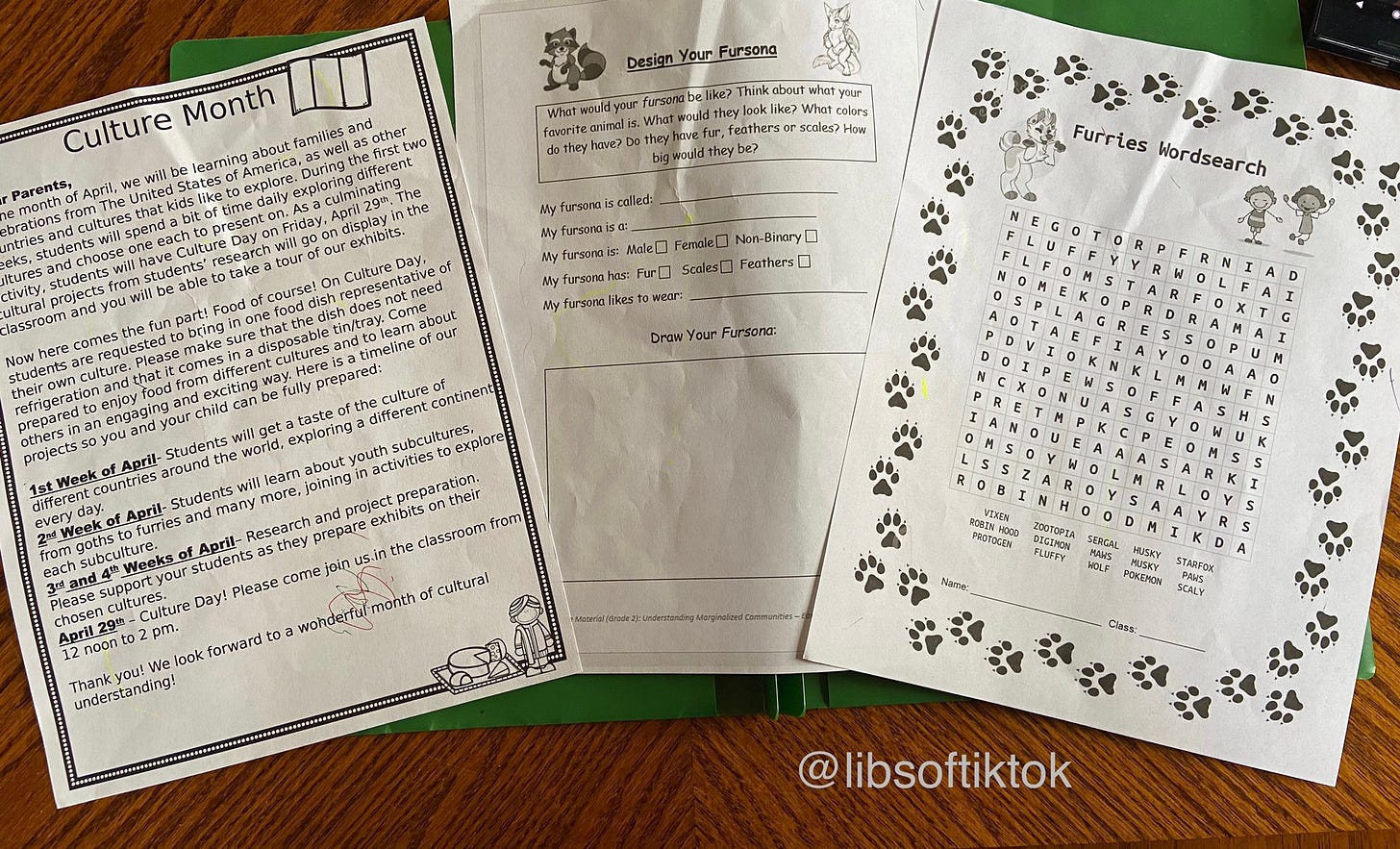






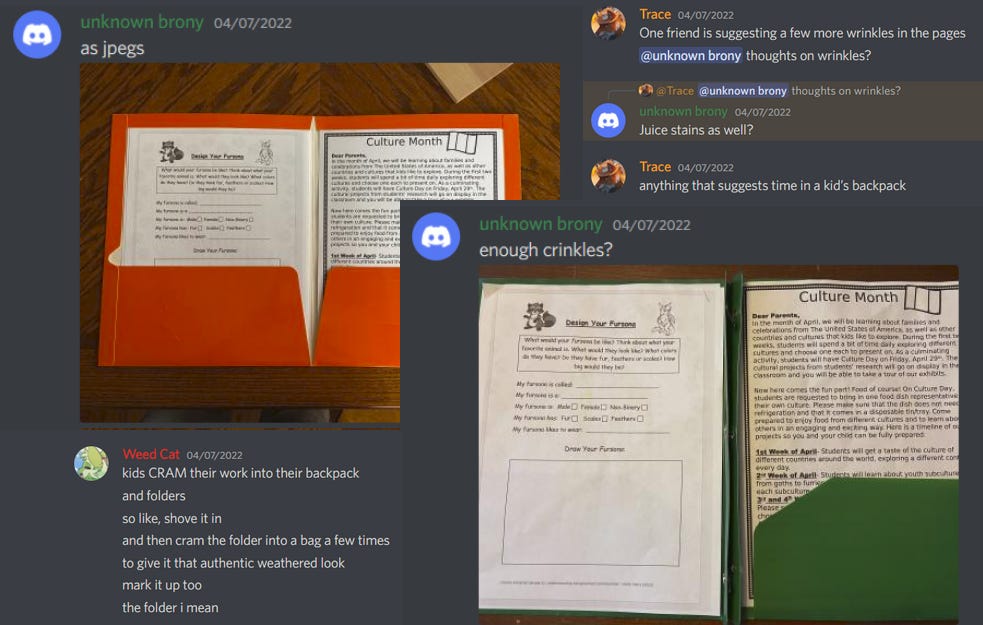



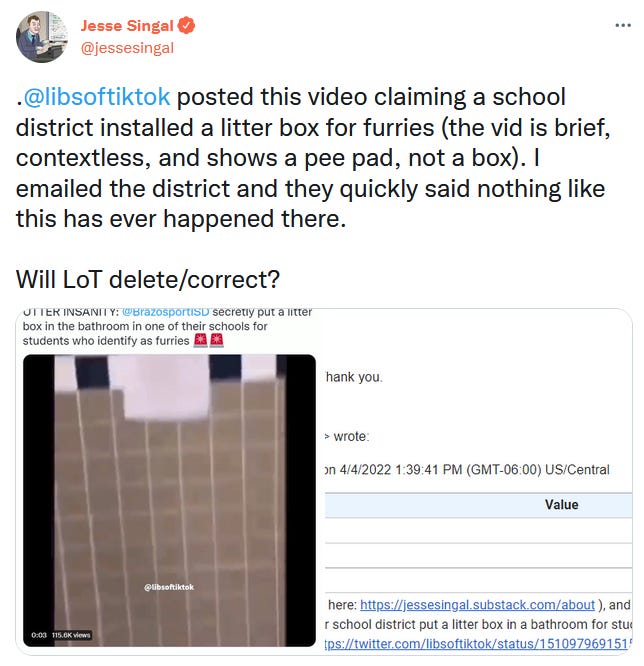
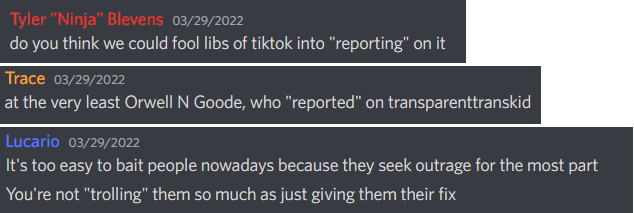









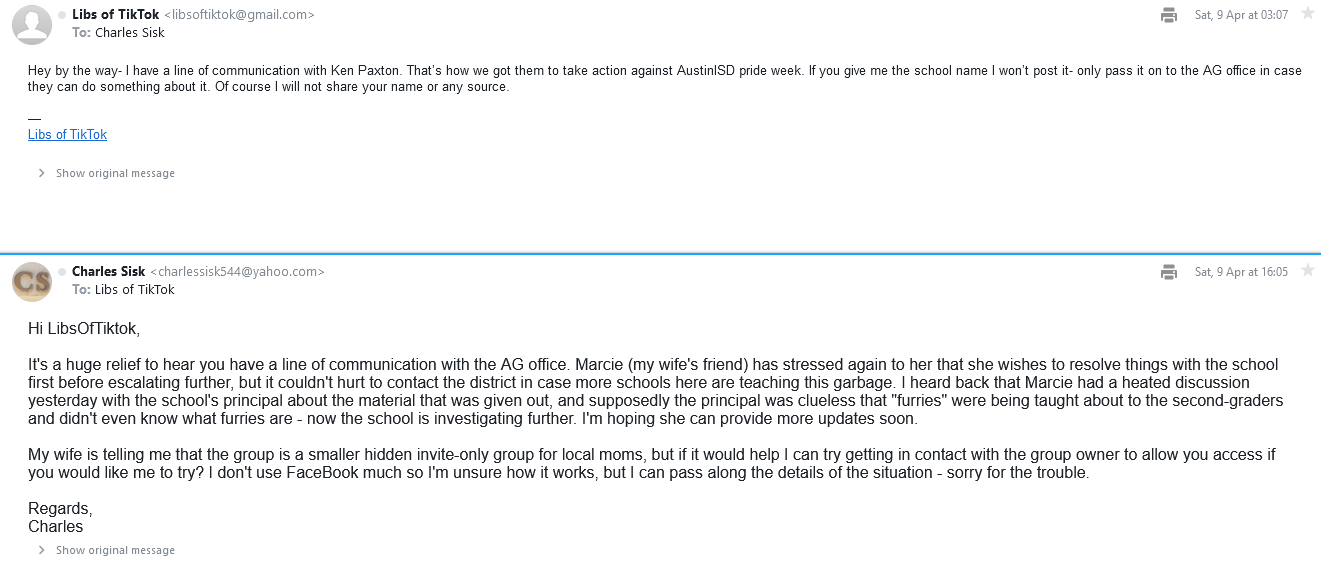


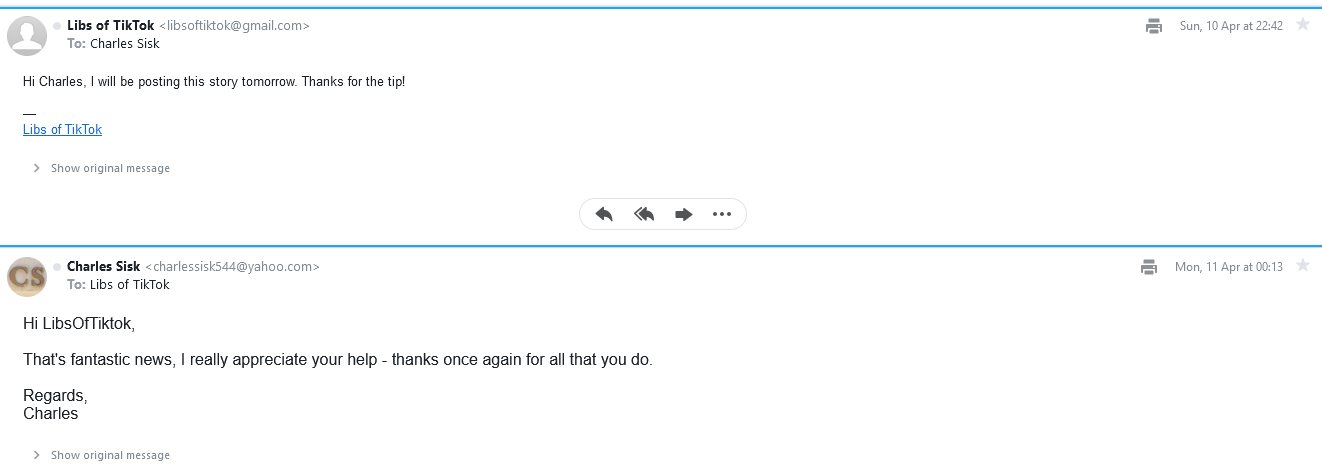




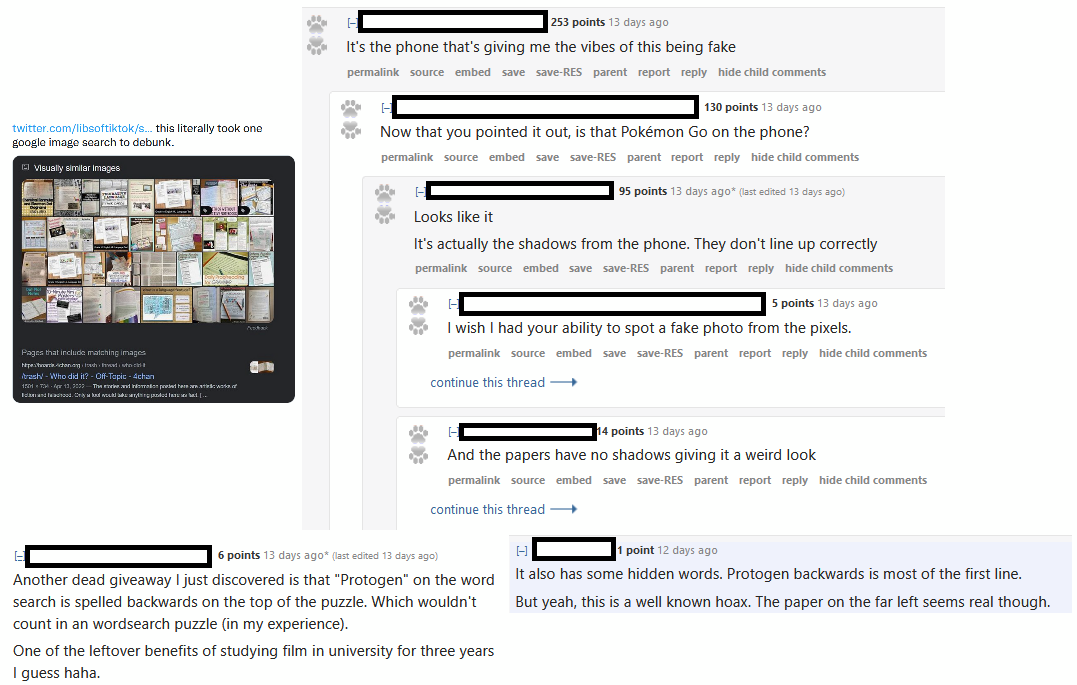

But the Libs account isn’t run by a trained journalist, so why would there be any presumption of truth or fact-checking to their posts? Shouldn’t we be skeptical of everything a random person posts on the internet? I guess to me this is the problem—even someone like Nellie Bowles (who should know better) thinks of the Libs poster as a “journalist.” The site is definitely treated like a news source by some outlets. I feel like journalists are becoming ignorant of what actually constitutes a credible news source — which damages their own credibility (and that of the field).
(I haven’t listened to the podcast yet; I don’t know if they talk about this.)
So now instead of funding the interesting, thoughtful "deep dives" that Katie and Jesse do we're funding.... pranks? K.